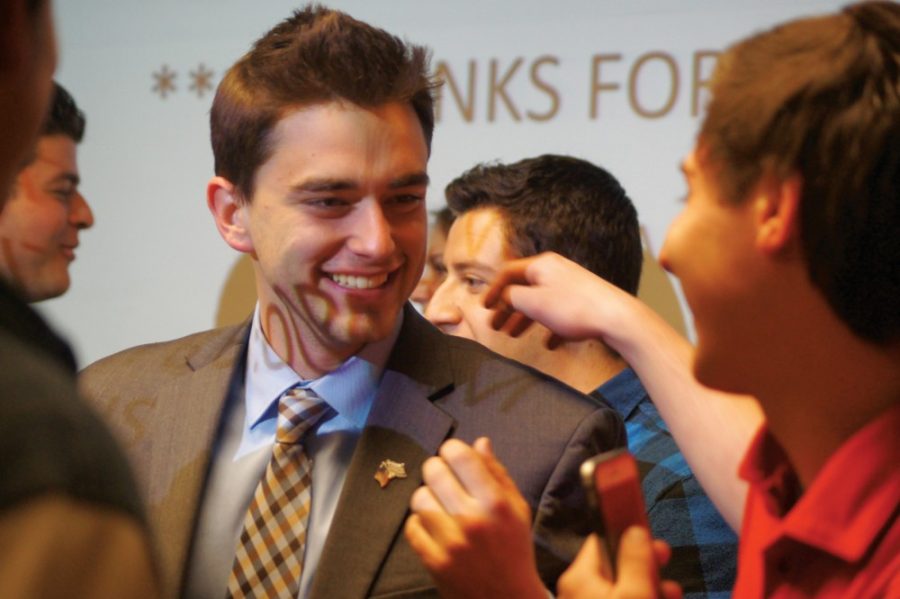In student government elections, campaign regulation isn’t always a black and white issue.
Since campaigning began in February, the Associated Students of the University of Arizona Elections Commission has received complaints regarding a mass text sent offering alcohol in exchange for campaign support, campaign materials and candidates campaigning inside the UA Main Library.
Less than a week ago, the Arizona Daily Wildcat received an anonymous email regarding a series of Facebook messages between a current senator, a senate candidate and other students about “library hopping.”
Elections Commissioner Leo Oppenheimer confirmed that allegations of inappropriate campaigning had been levied against several candidates, including presidential candidate Morgan Abraham.
“Library hopping” refers to candidates or campaign team members walking around the library and telling students about candidates and their platforms. Students would then be directed to the ASUA website, where they could access the online ballot, said Elena Gold, an ASUA Senate candidate and a participant in the Facebook messages.
“It did occur,” Gold said. “There’s no reason to hide that, because it is not against the elections code. The allegations were brought to the elections commission and they ruled in my favor that it’s not outlined in the elections code that that’s against policy at all.”
Tactics questioned
Despite the commission’s decision not to penalize candidates, ASUA did announce that there will be no campaigning or solicitation of votes in any UA library or computer lab during the general elections, effective immediately. The announcement was made in an email sent through the ASUA listserv on Tuesday morning.
“All of our decisions that we make are intended to make the election as fair as possible, but in a system where you can vote from wherever you want, it’s really difficult to do that,” Oppenheimer said. “Maybe having one polling site needs to be looked into in the future just to make sure everyone has the opportunity to vote privately, but in response to what’s going on, disallowing campaigning in the library or computer lab was our best solution.”
Sen. Valerie Hanna, who was also a participant in the Facebook conversation, declined to comment directly on the situation.
“Given the current elections code, there was no rule broken,” Hanna said. “But they’re [elections commission] realizing maybe there’s improvements that can be made to the election code, which really happens every year.”
Although Hanna wrote in the Facebook messages that participants would “help get out the vote for Morgan,” Abraham denied that he or his campaign team were involved.
“I’m just really glad we sent out that email and we caught it in time,” Abraham said. “I think people going to the library aren’t wanting to be bothered with stuff like that. Hopefully it doesn’t happen anymore.”
Other candidates questioned the ethics behind library campaigning.
“I think part of the ASUA voting constitution is to have unbiased voting,” said ASUA presidential candidate Dylan Duniho. If library hopping is happening, “it’s not letting people actually make an unbiased decision and to vote who they want to.”
Write-in process criticized
Members of ASUA have also questioned the legitimacy of the executive vice president election.
Ahead of the primary, candidate Mariam Nikola was the only person to have a write-in candidate packet accepted by the Elections Commission.
However, Nikola, an ASUA senate aide to Sen. Vinson Liu, collected only 200 votes, 100 short of the required number to to move on to the general election as an official candidate.
As a result, there were no official EVP candidates on the general election ballot, Oppenheimer said.
However, for the first two and a half hours of the primary election, the space for EVP did not appear on the ballot, due to technical difficulties. Additionally, primary election polls closed about 30 minutes early for all candidates, Oppenheimer said.
“I believe it was an unfortunate situation,” Nikola said. “I feel like anybody can see it as a problem and as [resulting] in a deficit of votes.”
Oppenheimer and the commission acknowledged that the errors could have resulted in a loss of votes for Nikola, but ruled that the number of votes received during those times for other positions was not enough to indicate that Nikola would have met the requirement, even without the technical glitches.
But other ASUA officials declared the problem was the commission’s, not the candidate’s.
“Mariam ended up with 200 write-in votes, but when you make a mistake like that you cannot say, ‘She probably wouldn’t have gotten it,’” Liu said. “You cannot fault the candidate when it was the system that messed up. How is that fair?”
Loopholes in system
After the primary election, the commission decided to allow students to campaign as write-in candidates for executive vice president during general elections — a process not defined in the elections code.
“I guess they found a loophole in the elections code which allows candidates to not run during primaries but run during the general race,” said current ASUA Sen. Bryan Namba. “It’s been an interesting election season thus far, compared to last year. Definitely a lot of loopholes.”
Every year brings new loopholes in the campaigning process, Oppenheimer said.
“Moving forward, obviously, I think there needs to be a lot that needs to be looked at to be changed,” Oppenheimer said.









